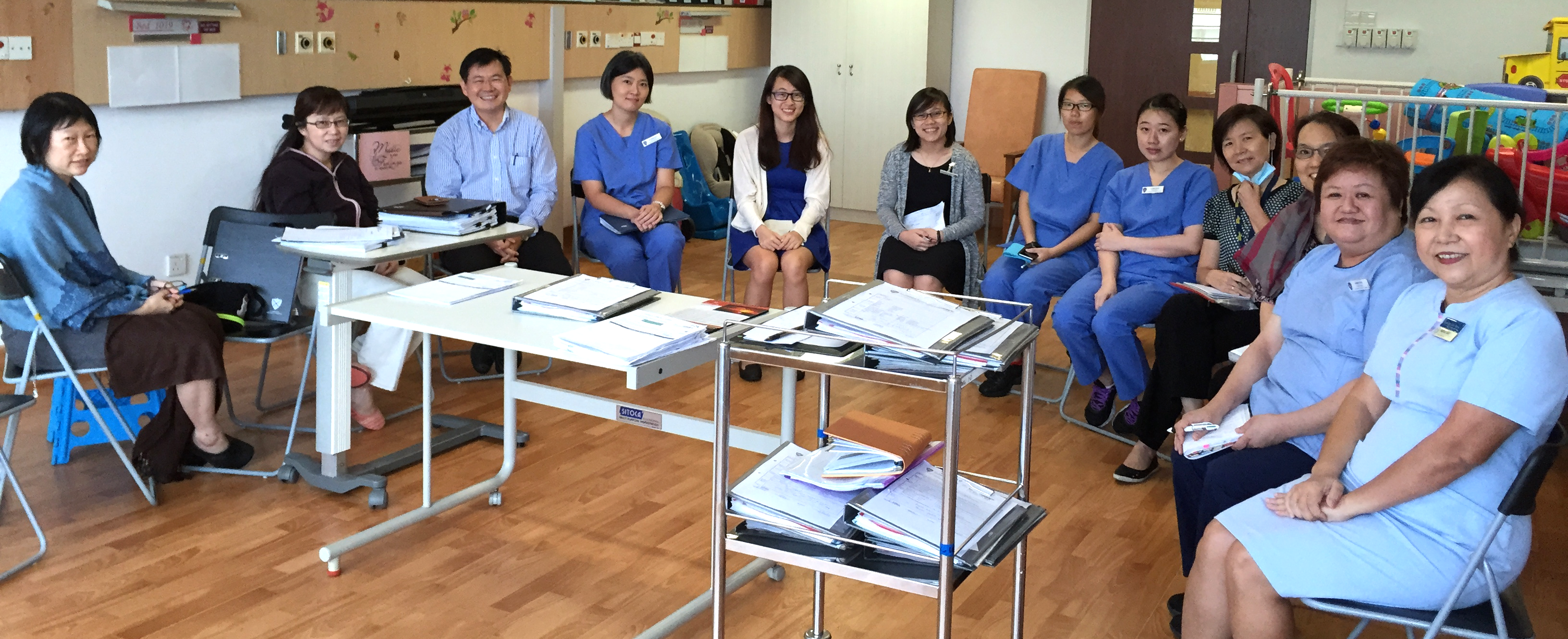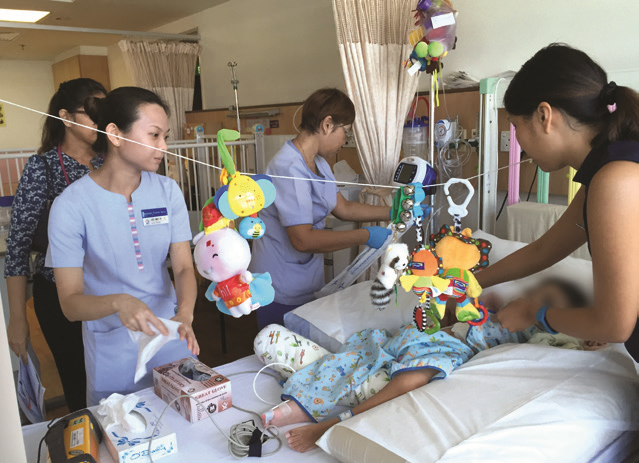Working in close partnership, a collaboration between KK Women’s and Children’s Hospital (KKH) and St. Andrew’s Community Hospital (SACH) is empowering technologically-dependent children and those requiring specialised care to live meaningful lives and integrate back into their communities.
A hospital is not the ideal place for a child to be in for the long term,” says
Dr Chan Yoke Hwee, Deputy Chairman, Division of Medicine and Senior Consultant, Children’s Intensive Care Unit, KKH. “As much as possible, all children deserve to experience family cohesion in the home, receive education in schools together with their peers, and enjoy social interactions in the community.”
“For children who depend on long-term life-sustaining technological or medical support, our mission is to lessen their need for hospitalisation and integrate them and their families back into their homes and communities whilst providing them support,” adds Dr Chan, who also heads the Paediatric Homecare Service at KKH.
The Paediatric Homecare Service helps to support children with tracheostomies, those requiring oxygen and airway support, those requiring tube feeding or long-term parenteral nutrition, and those requiring stoma care and clean intermittent urinary catheterisation. Since its establishment in 2001, the programme has benefited more than 1,700 children, and provided breathing support to more than 100 patients at home.

Working hand in hand: (left to right) Dr Fatima Singaporewalla, SACH; and Nurse Clinician Lee Mei Yi and Dr Cristelle Chow from KKH check on a patient's progress at SACH's paediatric inpatient facility.
|
Collaborative, community-based care
Key to the Paediatric Homecare Service’s success has been the ongoing close collaboration between KKH and St. Andrew’s Community Hospital (SACH), which has enabled it to expand beyond the home in adopting a community-based model of care for paediatric patients in Singapore.
“KKH and St. Andrew’s Community Hospital have been working together since 2008, when our paediatric homecare team provided clinical attachment training for nurses from SACH to assist in their establishment of an inpatient paediatric facility that provides care for children who require longer term non-acute medical and/or rehabilitative care,” says
Dr Cristelle Chow, Consultant, General Paediatrics and Adolescent Medicine Service, KKH.
The close collaboration fostered a partnership between KKH and SACH, tapping on SACH’s close ties with the community and KKH’s expertise in tertiary acute care to provide collaborative management for paediatric patients requiring custodial, respite and rehabilitative care.
To facilitate cross-institutional teamwork, the Paediatric Homecare team conducted an initial induction and attachment programme for the SACH team. Thereafter, medical professionals from the KKH Homecare team continue to attend fortnightly patient care conferences and paediatric ward rounds at SACH.
“Combined management from both KKH and SACH has been greatly beneficial in optimising progress for our paediatric patients with complex care needs, enabling seamless care for each child,” says Dr Chow.
“In addition to receiving step-down medical and nursing care at SACH, being outside the acute hospital setting also reduces their likelihood of acquiring nosocomial infections, and enables them to have a better quality of life.”

Leveraging combined strengths: Members of the KKH and SACH care teams meet fornightly to discuss the care needs of their paediatric patients. |
Helping families build meaningful lives
“Generally, paediatric patients cared for at SACH have the opportunity to attend the Early Intervention Programme for Infants & Children (EIPIC) at special schools several days a week. They also receive greater levels of interaction with social workers and more intensive rehabilitation from the SACH care team whilst the KKH team continues to monitor their progress and addresses their medical care needs,” says SACH Nurse Manager, Ms Karen Seng.
To date, 86 paediatric patients from KKH have benefited from community-based care at SACH. The Paediatric Homecare Team continues to partner with families and community healthcare providers such as nursing homes and hospices to strengthen their capacity to provide continuity of care for children requiring specialised care.
“When a child is in hospital for a prolonged duration, both the child and the family unit are greatly affected,” says Ms Seet Soh Cheng, a Nurse Clinician with the Paediatric Homecare Team.
“By empowering the family and community healthcare providers to care for technology-dependent children and those requiring specialised care in a more natural community setting, this model of care helps to strengthen family bonds and enables the child to experience a meaningful life while remaining safe in the community.”
About the KKH Paediatric Homecare Programme: To support the diverse and specialised needs of children requiring homecare and their families and caregivers, the Paediatric Homecare Programme is run by a multidisciplinary team comprising specialist nurse clinicians, community nurses, doctors, physiotherapists, occupational therapists, speech therapists, dietitians, pharmacists, medical social workers as well as staff with biomedical engineering expertise. Before a child is discharged from KKH into homecare, a home environment assessment is conducted, and the team engages and empowers the child’s parents and caregivers to optimise the home situation for recovery. This includes teaching them the skills and procedures to facilitate the child’s safe and effective discharge, and to provide the daily care needed to sustain the child’s health and well-being at home. Where necessary, caregivers are also taught to administer total parenteral nutrition (TPN) for children requiring intravenous feeding, and to operate life-sustaining medical technology such as CPAP (Continuous Positive Airway Pressure) and BiPAP (Bilevel Positive Airway Pressure) machines, oxygen concentrators or suction machines. Manuals detailing individualised care protocols and hands-on training are also provided. Homecare team members accompany the child and family home after discharge to settle them into the home environment, and conduct follow-up visits to assess how the family is progressing and render ongoing support. |

